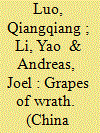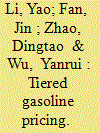|
|
|
Sort Order |
|
|
|
Items / Page
|
|
|
|
|
|
|
| Srl | Item |
| 1 |
ID:
179914


|
|
|
|
|
| Summary/Abstract |
Based on a detailed case study of the socialist transformation of the Shanghai Great World Amusement Centre (Dashijie), this article documents state-building efforts during the early years of the People's Republic of China (PRC). Between 1950 and 1958, the Communist regime incrementally transformed the power configuration within Dashijie, promoting dramatic changes in its personnel, institutional structures, drama performances, and physical space. Over the course of this process, Dashijie seemed to become a ‘loftier’ cultural organization in accordance with the aims of its transformation. This transfigured Dashijie, however, fell out of favour with the people of Shanghai. This multifaceted transformation process reflects considerable state capacities on the one hand and illustrates the complexity of state capacities—their unevenness and the limitations of a strong state—on the other. The complexity of state capacities thus shaped and was embedded in the process and outcome of this socialist cultural transformation. Since the Chinese state is once again making strenuous efforts at culture-building, an overview of cultural transformation in the early PRC era has important contemporary implications.
|
|
|
|
|
|
|
|
|
|
|
|
|
|
|
|
| 2 |
ID:
151714


|
|
|
|
|
| Summary/Abstract |
In recent years the Chinese Communist Party has moved to scale up, modernize, and commercialize agriculture by placing it under the direction of large commercial enterprises known as dragonheads. Although scholars have drawn attention to the rapid advance of capitalist-style farming in China, there has been little investigation into how villagers have been pressed to cooperate with this endeavor. In this article, we examine methods used by local officials to create a grape production base for a large wine company in Xinjiang, which entailed getting all the peasant households in several townships—many of which were strongly opposed—to shift from cultivating rice and raising fish to growing grapes on contract. In this aggressive campaign, Party cadres and influential citizens were mobilized to persuade and coerce villagers, using an array of incentives and disincentives, to join what ultimately proved to be a very risky venture.
|
|
|
|
|
|
|
|
|
|
|
|
|
|
|
|
| 3 |
ID:
150782


|
|
|
|
|
| Summary/Abstract |
This paper proffers a tiered gasoline pricing method from a personal carbon trading perspective. An optimization model of personal carbon trading is proposed, and then, an equilibrium carbon price is derived according to the market clearing condition. Based on the derived equilibrium carbon price, this paper proposes a calculation method of tiered gasoline pricing. Then, sensitivity analyses and consumers' surplus analyses are conducted. It can be shown that a rise in gasoline price or a more generous allowance allocation would incur a decrease in the equilibrium carbon price, making the first tiered price higher, but the second tiered price lower. It is further verified that the proposed tiered pricing method is progressive because it would relieve the pressure of the low-income groups who consume less gasoline while imposing a greater burden on the high-income groups who consume more gasoline. Based on these results, implications, limitations and suggestions for future studies are provided.
|
|
|
|
|
|
|
|
|
|
|
|
|
|
|
|
|
|
|
|
|